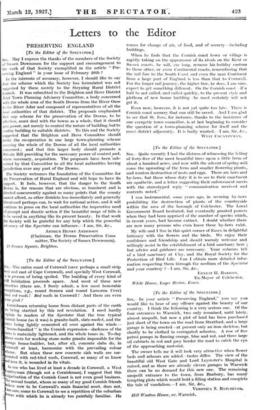[To the Editor of the SPECTATOR.] Sul,--The entire coast of
Cornwall (save perhaps a small strip 'e,t and east of Cape Cornwall), and specially West Cornwall, b in process of being spoiled. The building of every kind of RI habitation proceeds apace. And most of these new atrocities (there are, I freely admit, a few most honorable exceptions, e.g., round Sennen and round Lamoma Cove) have red roofs ! Red roofs in Cornwall ! And there are even sum pink!
Cornishmen returning home from distant parts of the earth ere being startled by this red revolution. I need hardly explain to readers of the Spectator that the true typical lornish house (as it was) is granite-built, slate-roofed, and the ,,ales being lightly cemented all over against the winds- • broom-handled " is the Cornish expression—darkness of the lates is materially lightened, and the whole tones in. To-day labour costs for working stone make granite impossible for the average house-builder, but, after all, concrete slabs do, in °catcall at least, harmonize with the prevailing colour • eme. But when these new concrete slab walls are sur- merited with red-tiled roofs, Cornwall, as 'many of us know d love it, is wounded in its vitals.
As one who has lived at least a decade in Cornwall, a West untryman (though not a Cornishman), I suggest that this ligarization of the Cornish Coast is not even good business. !Annual tourist, whom so many of my good Cornish friends Ileve now to be Cornwall's main financial asset, does not, am sure, come to Cornwall to see a repetition of the suburban uses with which he is already too painfully familiar. He
comes for change of air, of food, and of scenery--including buildings.
When he finds that the Cornish coast town or village is rapidly taking on the appearance of its rivals on the Kent or Sussex coasts, he will, ere long, remove his holiday custom to those other, or even Continental coasts, remembering that the rail fare- to the South Coast and even the near Continent Irons a large part of England is less than that to Cornwall. For the longer rail journey, the higher fare, he does, I am sure, expect to get something different. On the Cornish coast—if a halt be not called, and called quickly, to the present style and plethora of new house building--he most certainly will not get it.
Even now, however, it is not. yet quite too late. There is Cornish coast scenery that can still be saved. And I am glad to see that St. Ives, for instance, thanks to the insistence of one energetic town councillor, is at last beginning to consider the question of a town-planning scheme for itself and the coast district adjacently. It is badly wanted.—! am, Sir, ate., VEST COUNTRYMAN.






























































 Previous page
Previous page